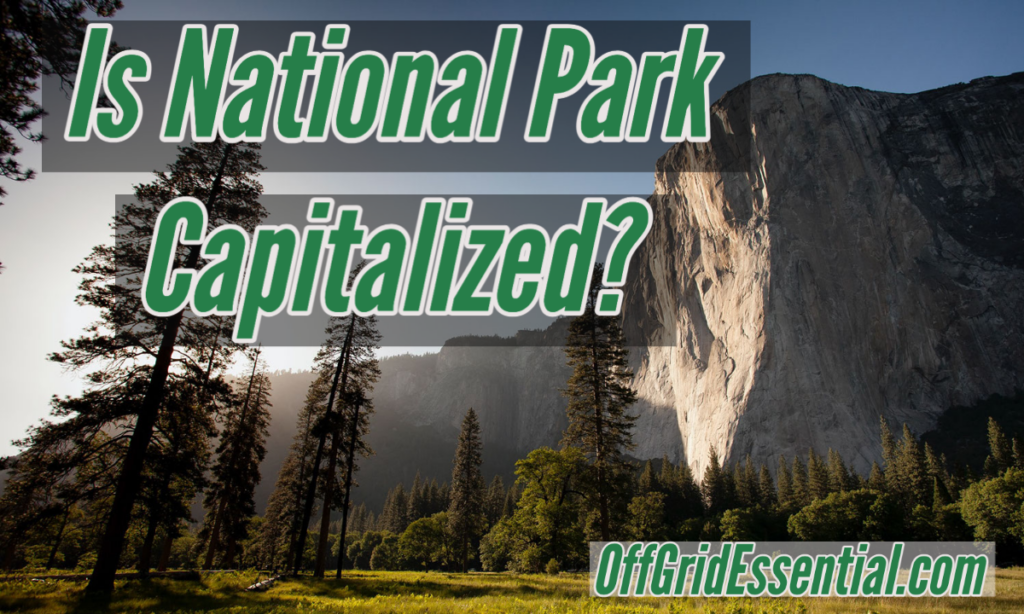
English is one of the world’s more confusing languages. If you are wondering whether to capitalize the term “national park,” the short answer is that talking about national parks as a group, the term will generally not be capitalized.
However, depending upon how the term is used, or whether it is part of a larger phrase, there will be times when it does get capitalized.
Read on to get the lowdown on the English rules that govern the capitalization of proper and common nouns and how this pertains to the term “national park.”
Once you understand the rules regarding noun capitalization, you can use them for any noun in the English language!
While native speakers naturally learn many of the pricklier rules of grammar, usage, and spelling, there are still many gray areas that can trip up new English learners and first-language speakers alike.
Consider, for example, the use of irregular plurals, such as mouse and mice. Rules like these can be frustrating, to say the least. English conventions regarding capitalization can be equally difficult to memorize.
Read on for a quick overview of the capitalization rules that affect the term “national park” and when it does and does not need to be capitalized.
COMMON NOUNS
In order to understand when to capitalize terms like “national park”, it is first necessary to take a look at common nouns and proper nouns.
Common nouns are not capitalized, while proper nouns are. National park, when used to describe the general group or category of parks, is not capitalized.
In American English, a common noun is a noun that names a general person or class of thing, or an individual belonging to that class.
For example, the word students is a common noun. It refers to a general class of people who fall under this category. Likewise, a student is also a common noun as it could be referring to any member of a general group.
Other common nouns include the words: people, city, colors, dogs, animals, friends, or any other general class of person, place or thing. Common nouns may also be modified by an adjective. An example would be “smart student” which is still referring to a general group, but giving it a descriptor.
Thus, when referring to national parks as a general group, as in the sentence, “We are hoping to visit all of the national parks,” the phrase will not be capitalized. As mentioned above, adding an adjective does not change this rule.
“We think that Yellowstone is one of the most beautiful national parks,” for example. A simple way to remember this is that if you are not referring to a specific national park or affiliated organization, office, or job title, it does not need to be capitalized.
PROPER NOUNS
Proper nouns, in contrast to common nouns, are always capitalized. When the term “national parks” is used as part of a proper noun, it may also be capitalized. Don’t panic yet! The rules are fairly straightforward.
A proper noun is a noun that refers to a singular specific entity, person, place or thing. Proper nouns include things like names of cities, countries, people, schools or buildings, organizations and much more.
For example, names of cities and countries – Paris, Atlanta, South Africa, Brazil, Tokyo – are always capitalized, because they refer to a single, specific place. In contrast, the common nouns “city” and “country” are general and are not capitalized.
Names of people, specific job titles, names of companies or other entities are also capitalized. It can get a bit tricky here, so stick with us.
Take for example, the term “president.” When using president as a general descriptor, as in this sentence, “The presidents of the countries are having a meeting in Geneva,” we do not capitalize president.
That is because it is referring to presidents as a general group, or type, of person. However, when we are using this word to refer to a specific person with that title, as in “President Abraham Lincoln.”
EXAMPLES OF CAPITALIZATION RULES FOR “NATIONAL PARKS”
Similarly, the term “national park” is capitalized in cases where it is part of an official title or the name of a specific park. Here are two examples of sentences to demonstrate this. “We want to see all the national parks, starting with Yellowstone.”
Contrast that with the following sentence. “The first stop on our road trip is going to be Yellowstone National Park.” In the first sentence, “national parks” is a common noun, referring to the general group that includes all national parks, so it is not capitalized.
In the second sentence, “national park” is a part of the full name of a specific national park – Yellowstone – which is a proper noun.
However, you should note that names of specific national parks are not the only circumstances in which the term “national parks” could be capitalized.
Another example would be in the case of specific organizations or job titles. The U.S. Department of the Interior, which oversees national parks, capitalizes the names of the park departments on its own website.
National Park Service, for example, is a proper noun because it is referring to a specific, discrete agency. In contrast, a reference to “national park services” as a general set of amenities at parks would not be capitalized.
National park rangers is another example of a common noun, and as such, does not require capitalization.
The above may seem like a great deal of information. While it’s important to understand the rules that govern capitalization, the question of whether or not to capitalize the term “national park” can really be boiled down to a few simple considerations.
First, is “national park” referring to the entire group (or any, non-specific member of that group) of parks? If so, it is a common noun and should not be capitalized.
If, however, “national park” is being used as part of the full name of a specific park, organization, or title, it is a proper noun and should be capitalized. These same rules can be applied to other nouns as well.
